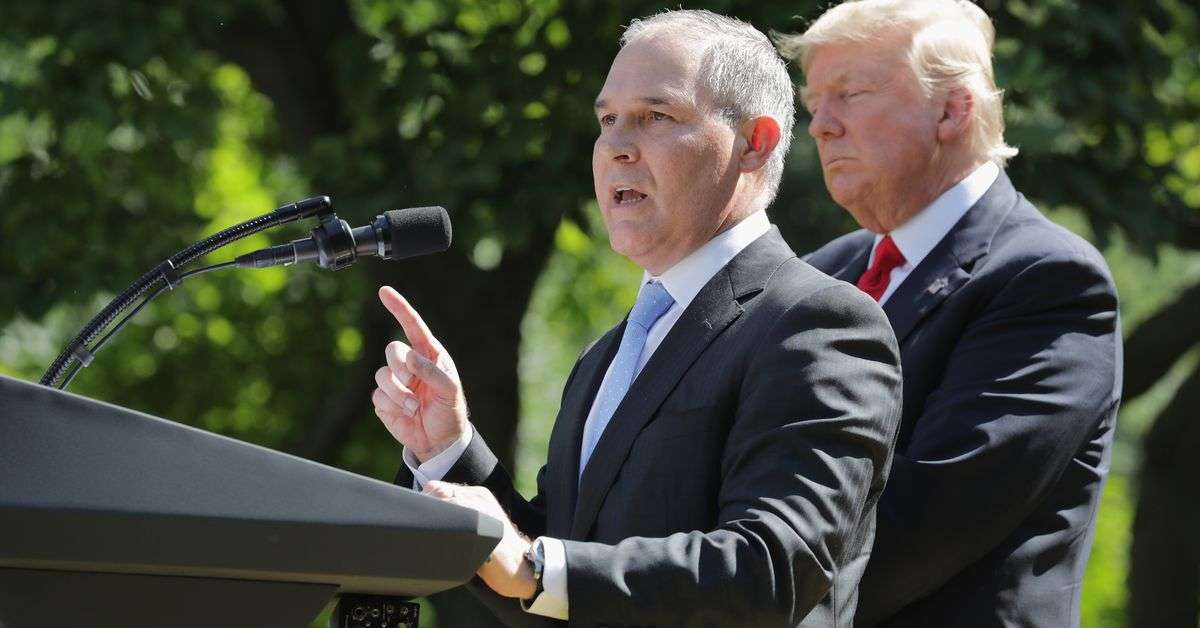The Environmental Protection Agency is calling for a reduction of greenhouse gas emissions standards for model year 2022-2025 cars and light trucks. The agency said today that the standards — which were put in place by the Obama administration in 2012 — are “not appropriate and should be revised.” The move brings to bear a fight that has been brewing since the earliest days of the Trump administration, when the president called the regulations “out of control” at a meeting with executives of the big three automakers.
The agency cited a recent drop in oil prices and the subsequent decline in the sale of smaller vehicles in favor of crossovers such as SUVs as some of the main reasons it believes the current standards are unreasonable. The EPA will now work with the National Highway Traffic Safety Administration to develop new standards, which will then have to be proposed and subjected to public comment.
The emissions standards in play were developed in 2009, at a time when oil prices were higher, sales of larger vehicles like SUVs were lower, and American automakers had recently taken a bailout from the US government. When the standards were implemented in 2012, the Obama administration set the bar high: automakers would have to improve the average fuel efficiency of their fleets to 54.5 miles per gallon by 2025, almost double where fuel efficiency standards were at the time.
However, those standards allowed for a review period, which was underway when Donald Trump won the presidential election in 2016. The Obama administration closed the review shortly after Trump was elected; then-EPA administrator Gina McCarthy found that the standards were “appropriate,” and the agency determined they would both save consumers money and “provide benefits to the health and welfare of Americans.”
Pruitt says Obama’s administration set the bar too high
Current EPA head Scott Pruitt said in today’s release that the Obama administration “cut the [review] process short with politically charged expediency, made assumptions about the standards that didn’t comport with reality, and set the standards too high.”
A document released by the EPA in support of its decision lays out a number of reasons why it thinks the standards are too high. It cites a drop in oil prices, the slow adoption of electric vehicles, the rise in sales of SUVs and trucks, as well as fear that consumers will wind up paying more for highly efficient vehicles.
But some automakers have recently said that they aren’t in favor of rolling back the standards that are in place. Ford Motor Company chairman Bill Ford and CEO Jim Hackett wrote in a post last week that they’re only looking for “flexibility” in the rules. Honda echoed that in its own statement, saying that it wasn’t looking for a “reduction in overall stringency.”
One thing these automakers say they do want is a more cohesive national set of emissions standards. Since California had set its own emissions standards before the Clean Air Act was put into place in 1970, it has been allowed to continue that practice thanks to a waiver that was granted as part of that regulation. Pruitt is also considering revoking that waiver, per today’s announcement.
That could help create a more clear set of national emissions standards, but California officials have stated that they are prepared to fight the EPA on any attempt to revoke the state’s waiver.
It’s unclear what kind of effect the proposed rollback could have on the environment, or on consumers, until more specifics are laid out by the EPA and NHTSA. And while automakers typically make different cars for different markets, the recent pushes from Europe and China to curb emissions could serve as a sort of backstop; in response, a number of car companies have pledged to convert large portions of their fleets to hybrid and electric technology in the coming years.
But these companies also often make different cars for different global markets. And SUVs, which are typically less fuel-efficient than smaller cars, are selling better than ever in the United States.

Ebelglorg on April 3rd, 2018 at 03:10 UTC »
So will this EPA do any environmental protecting or do they plan to just do comically villainous and obvious favors to corporations that do the opposite of protecting the environment.
Live2ride86 on April 3rd, 2018 at 03:02 UTC »
sigh ...these were brought in because pollution in cities was unbearable. Does he want Los Angeles to look like Beijing?
Hagenaar on April 3rd, 2018 at 02:10 UTC »
No thinking American says 'Yes, I want my next car to use more gas to go the same distance'. This whole thing stinks of expensive lobbying by the automotive and oil industries.